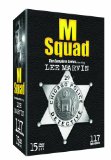| Reviews & Columns |
|
Reviews DVD TV on DVD Blu-ray 4K UHD International DVDs In Theaters Reviews by Studio Video Games Features Collector Series DVDs Easter Egg Database Interviews DVD Talk Radio Feature Articles Columns Anime Talk DVD Savant Horror DVDs The M.O.D. Squad Art House HD Talk Silent DVD
|
DVD Talk Forum |
|
|
| Resources |
|
DVD Price Search Customer Service #'s RCE Info Links |
|
Columns
|
|
|
M Squad - The Complete Series (Special Edition with Soundtrack CD)
They tell me you are wicked and I believe them, for I
have seen your painted women under the gas lamps
luring the farm boys.
And they tell me you are crooked and I answer: Yes, it
is true I have seen the gunman kill and go free to
kill again....
And they tell me you are brutal....
Fierce as a dog with tongue lapping for action, cunning
as a savage pitted against the wilderness. Carl Sandburg
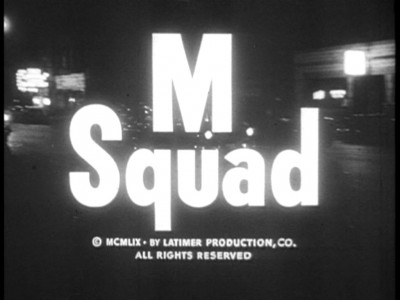
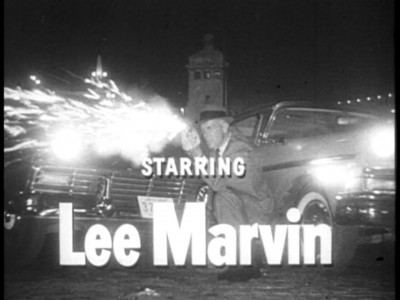
A lurid, pulpy actioner. Timeless Media Group, in association with Universal, has released M Squad - The Complete Series, featuring all 117 episodes of the noirish, nightmarish NBC police suspenser that aired from 1957 to 1960. Starring that mesmerizing icon of big-screen action thrillers, Lee Marvin, in his first and only TV series, M Squad plumbs the depths of the sleazy Chicago underworld to offer up a dizzying array of base, sensationalistic crime stories, put over in a brutal manner to the driving jazz notes of Benny Carter and Count Basie. As primitive (in the very best sense of that word) a TV entertainment as one could hope for, M Squad is brisk, invigorating viewing for vintage TV crime fans.
By 1957, no one could blame NBC for looking around for another hard-hitting police series to add their schedule. Their venerable cop show Dragnet had been a consistent ratings' powerhouse for years (reaching 4th, 2nd, and 3rd in the year-end Nielsen's for the years 1952 through 1955), and while still a winner in the ratings, Dragnet, as is inevitable with any successful show, eventually began to trend downward, dropping to 11th for the year prior to the premiere of M Squad (before it was knocked out of the Top Thirty altogether against sitcom The Real McCoys in 1957, and westerns Cheyene and Sugarfoot in 1958). As well, 1957 marked a significant rise in overall crime in the United States (particularly in violent crime), a trend that would continue until the 1970s, which, coupled with the public's growing fascination (and some might say horror) with the continued break-down of established pre-WWII social norms (garishly reflected, albeit within the censorship rules, in the nation's pop culture), created an opportunity for American TV viewers to wrestle - safely - with complex social problems through their favorite TV shows and stars (one might argue that interestingly enough, American TV viewers overwhelming "looked back" to the nostalgic Western genre to filter through these new tensions, resulting in the popular adult, psychological Western series such as Gunsmoke and Have Gun Will Travel). And while M Squad only lasted three years and never cracked the Nielsen Top Thirty, it was instrumental in transitioning Marvin from supporting roles (usually as a heavy) to lead roles in feature films; whereas he often memorably played villains with a penchant for violence (his turn in Lang's The Big Heat is probably his most memorable from that period), his role on M Squad allowed him to segue into "hero" roles on the big screen...with a penchant for violence, of course.
M Squad, at least in design and execution, was as bare-bones as one could possibly get in a 1957 police procedural series. Set in Chicago (an unusual choice, considering L.A. and New York's usual lock-grip on private eye, detective and police shows up to that time), M Squad starred Lee Marvin as Detective Lieutenant Frank Ballinger, who was attached to "M Squad," a special free-floating division of the Chicago Police Department whose members could be assigned to any other division within the force - from homicide to bunko - as needed (the "M" in the title is never referred to anywhere in the series as representing "Murder" or the "Mob" or "Mafia"). Loosely supervised by his superior, Captain Grey (Paul Newlan), Ballinger is called in after a particularly violent or tricky crime has been committed, where he then proceeds, through dogged, flat-foot police work, to break the case, usually preventing additional crimes by the perpetrator by either beating him senseless or drilling him with his snub-nosed Smith & Wesson .38 Police Special.
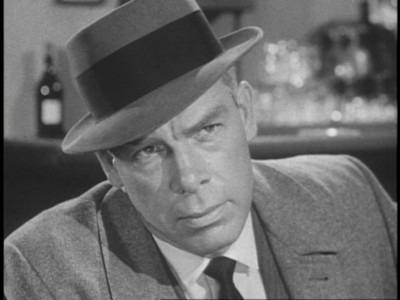
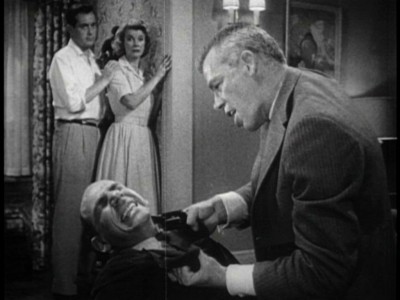
And that's it for M Squad. Week after week, with metronome precision, the same basic set-up was recreated, with only the manner of the crime altered within the series' framework. Locked down to almost the equivalent of those violent comic books of the late 50s that attracted returning vets who only wanted action and plenty of it, M Squad stripped away almost all of the reassuring, grounding elements that went with presenting a weekly series - a fully developed lead character, an established personal life for the lead, reoccurring sidekicks or friends - to present a harsh, angry depiction of relentless crime and punishment, American-style, with precious little time for the niceties of character development or complex plots within its tight half-hour format. M Squad's star, Lee Marvin, while certainly a familiar face by 1957 to moviegoers and TV viewers (he had recently scored a substantial co-starring role in MGM's high-profile flop, Raintree County), wasn't exactly a household name yet, either, and his handsome/ugly face and his cooly detached yet obviously simmeringly violent persona further presented a rather anonymous, vaguely threatening allure to the audience that wasn't the norm back in "we need to be reassured" 1957 America.
Of course today, M Squad may well be better known for its influence on the creators of Police Squad and The Naked Gun film series (who basically ripped it off in its entirety for the purpose of parody), but seen within the context of the American TV police series timeline, it seems far more important than those later funny but slight embellishments. While M Squad certainly owes more than a little bit of its structure to the previous Dragnet (the terse, unemotional voice-over narration, the concentration on "just the facts, ma'am" exposition), M Squad does have a noir element to it - filtered through a be-bop, jazzy, brutal hipster sensibility - that's quite alien to Jack Webb's almost kabuki-like formalism of Dragnet. Ballinger, an agent for justice in "his" town Chicago (which is featured quite prominently in each episode, courtesy of some marvelously evocative location pick-up shots, most featuring Marvin himself in Chi-Town), is just that and only that: an agent of the law with precious little else to distinguish him from the equally nameless criminals he plugs every week. For the lead character who appears in almost every scene of 117 episodes of a three year series, Frank Ballinger is remarkably anonymous. We never see where he lives. We never see him with a girl, out on a date. We never see him engage in any kind of off-duty activity. We never even hear him discuss an off-duty life (although once or twice, someone makes a comment about Frank knowing a lot of women). He exists only within the claustrophobic set-up of the show which focuses relentlessly on his police-related duties. The only person he seems to engage on a regular basis is his boss - and we never get to "know" him, either. Frank Ballinger is, as his narration often suggests, simply a physical manifestation of the city of Chicago's police department. And that's all.
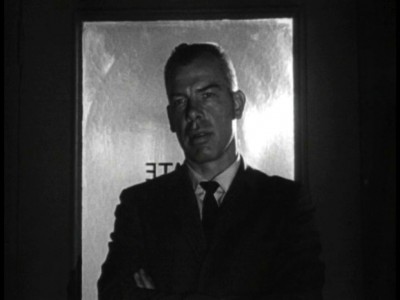
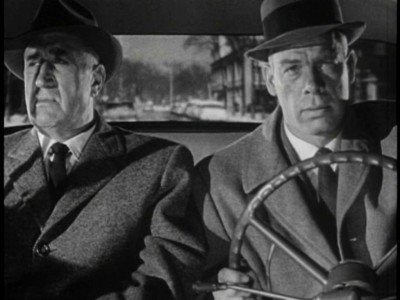
And any personal touches that creep into the character come strictly via his police duties. We learn that at times, Frank is disenchanted with his job, in the frequently noirish voice-overs that make M Squad play often like some forgotten little B-programmer gem ("Sometimes nobody wins. And you're just a cop who's done his job. And you go home, wondering why you don't have a feeling of satisfaction when you nail some people," from The Shakedown). Yet this sense of weary professional (and moral) defeat is largely dropped, to be replaced with the more Chandler-esque "gallant knight among lowlifes" sensibility ("The town looked clean and honest and innocent. I hoped that all the people felt as good as I did, that the law, in protecting its own, had protected the city at the same time," from Neighborhood Killer). If Frank has tender feelings about women or children, it's only expressed through the performance of his duties (such as the remarkably funny moment in Death by Adoption, where Marvin has some obvious fun, gruffly/sweetly feeding a laughing baby), never in a moment outside his life as a cop. As for personal friendships, he always seems to know old cons and sharpies, or friends from the force, but they're held at a distance, merely plot devices to keep the stories moving. The most meaningful interaction Frank has with another person throughout M Squad is with his boss, Captain Grey, and even that is limited mostly to shop talk (and it's quite believable shop talk, too, with Ballinger and Grey having a kidding/grumbling relationship that seems about right for two pros who spend a lot of time together). The chain-smoking, hard-nosed, professional cop Frank Ballinger, is a mystery to the audience in all areas other than his thoughts on a particular case at the present time. Everything else is superfluous.
And while the noir aspects of the show are frequently pronounced (the beautifully grim, chiaroscuro lighting effects, with quite a few scenes taking place in a night-time world of sharpies, molls, psychotic killers, low-life bums and scheming femme fatales rubbing elbows with the swells from Chicago's Gold Coast; a depiction of a thriving underworld where the relentless implementation of violence and even torture are used to settle the most base, venal criminal arrangements), there's a hipster looseness to M Squad, an almost goofy, giddy reveling in the thrill-kicks of violence and jazz and the basic squalidness of human beings, that goes beyond the often-times somber, fatalistic morality tales of noir. With Frank rendered almost a cardboard cut-out of an avenging cop, he's free to indulge in the pulpy pleasures of a character not bound by complex motivations. M Squad often plays like those lurid True Crime and men's adventure magazines that were reaching their zenith in the late 50s, where the sizzle was more important the steak, so to speak. "Sensation" is everything in M Squad, where character motivation is all but eliminated in favor of setting up a rather ghastly crime, and then letting angry Frank loose on the underworld to try and solve it - usually with his fists and his gun (there's an insanely right, correct shot in The Widows that sums up the series quite nicely: Frank, his cover blown during a set-up, calmly starts firing at some punk, while keeping his cigarette calmly in his mouth, never losing a drag). These are excessively violent cartoons, really, jazzed up with funny hep-cat dialogue ("Mickey Kilgrew. 37-26-36. IQ? 13, " from Mamma's Boy) and the blindingly cool music cues of legend Benny Carter (who eventually scores most of the third season episodes). These are jazz riffs on violence and crime and justice, more than they're meaningful "stories." The wonderfully obsessive Dragnet, with its almost pathological devotion to correct police procedures holding back the looming chaos of illegality, is nowhere to be found in the jangly M Squad. The expositional framework is just an excuse for crude shock effects and sensation. Always sensation, daddy, along with some jive-ass talk ("When it comes to scoring, I'm the original kid from Scores-ville!" "Yeah, I bet you are." "When I dig a score, I like to spread it around. I gave him a chance to fly high, but he just wasn't cool." "But you are?" "Yeah!" "Well, we got a little chair down in States-ville that will warm you up plenty," from More Deadly).
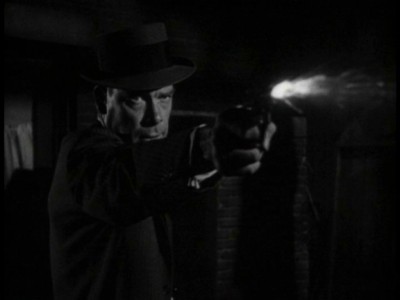
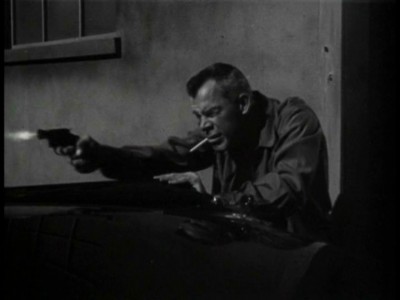
Even though each episode ends with an obviously tacked-on "moral" where Frank intones that drug dealing, murder, blackmail, fraud, juvenile delinquency, and terrorism have been miraculously scrubbed away in Chicago (a hoot when one realizes that the infamous "Summerdale Scandals" - where Chicago cops were discovered to be actually boosting stores in conjunction with a known cat burglar, while higher-ups knowingly covered it up - was just about to break nationally in 1960), violent crime in the service of baser desires is never more than another week's episode away in M Squad. With the (unintended) aid of the fairly poor transfers here for M Squad, the show takes on a cheap, Grade-Z programmer look that only further cements the series' True Crime mock-ups. Violence is frequent, and largely unsentimental - both from the criminals' and the police's perspectives. Criminals in M Squad kill often, and they like it. And Ballinger beats them with his fists, or ventilates them with his S&W, before happily sending them off to the gas chamber or electric chair (if you go by M Squad's successful capital punishment ratio, Illinois must have had not just an electric chair, but electric bleachers). Those dopey messages of "Hope and Change," Chicago-style (uh...yeah) at the end of each episode, are patently phoney (even Marvin sounds humorously noncommital during his delivery of them). The thrills of M Squad come not from justice upheld, but from vengeance served.
Right from the beginning, M Squad serves up the sensationalistic, sick thrills that must have really jolted the kids staying up late on Friday nights. Pulpy stories include a psycho killer bumping off people to appease his OCD (Face of Evil); a mamma's boy serial killer who has a thing for blondes, with his murderous rage set off by a song (Blue Indigo; where Frank hilariously intones, "Everyone is capable of being mentally disturbed."); a serial sniper (Shot in the Dark); Frank's battle with a bunch of psycho motorcyclists (watch Marvin get a chance to imitate some moto-punk - a la The Wild One - in The Phantom Raiders); a crime school of death, where punk-in-training Tom Laughlin giggles while he pushes the principal out the window to his death (Burt Reynolds, with real hair, shows up as well in the gloriously dreadful The Teacher); more crybaby psycho killers in High School Bride and The Second Best Killer; a guy beaten to death with a saxophone - crazy, baby! - in Murder in C-Sharp; a killer circus clown who bullwhips Frank (!) in The Tiger's Cage; a grenade attack on some poor shlub sleeping in his hammock in the appropriately titled,A Grenade for a Summer's Evening, and my personal favorite, Pitched Battle at Bluebell Acres, where a bunch of remorseless bank robbers who steal a bazooka to blow safes and knock out pursuing police cars, buy the farm when Frank hunts them down with a Thompson submachine gun, eventually blasting the head psycho to smithereens with a casually-tossed grenade (take that, Miranda rights!). By the time M Squad really swings into gear during its second season (when Count Basie's hypnotically driving theme is utilized and Marvin gets a mean, nasty-looking crewcut, emphasizing the primitive ugliness/beauty of his long, rangy face, along with a new, iconic opening that has Frank blasting some unseen foe with his Police Special), viewers tired of Westerns that had more Freudian talk than a year spent with a head shrink on his couch, could tune into M Squad for resolutely impolite thrills.
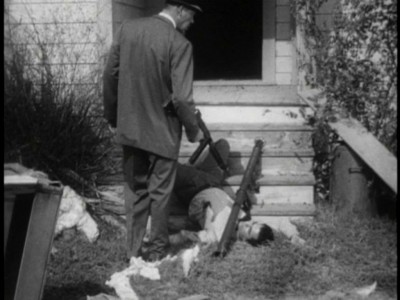
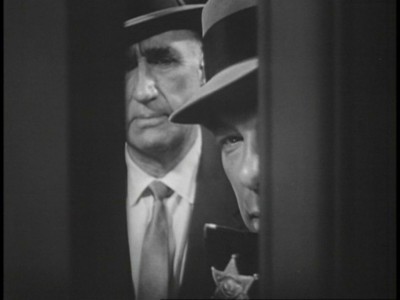
The DVD:
The Video:
If you're familiar with Universal's recent policy of leasing the DVD rights (only) for some of their library TV titles, then you'll know that smaller releasing companies like Timeless Media Group are only granted the rights to release titles like M Squad - The Complete Series - they're not given any prints by Universal. So, it's up to TMG to find all available prints and put them out there, often without the budget to significantly clean them up. Originally, according to sources I've read, M Squad - The Complete Series was going to be a "Best of" compilation, until fans implored TMG to include all the episodes - which TMG did by going a rather remarkable route: they asked fans to supply the missing episodes. Therefore, video fidelity varies about as widely here as I've ever seen for a DVD release of a multiple-season TV release. Quite a few episodes of M Squad - The Complete Series look quite nice, with a relatively sharp picture, moderate grain, and appropriate gray levels. Scratches, however, are present on almost every episode. However, quite a few episodes of M Squad - The Complete Series are also of very low, low quality (TMG actually runs separate apologies for The European Plan and Voice From the Grave, saying these were the best transfers they could come up with). 16mm copies and video dupes make up quite a bit of the episode transfers in M Squad - The Complete Series, which, when looked at next to the better quality transfers - which aren't stellar to begin with - look downright bad, with almost indecipherable night scenes or blown-out contrast, or so much video noise that it's hard in a handful of episodes to see what the hell is going on. Anyone expecting the video quality of big company vintage TV DVD releases, will not find that here in M Squad - The Complete Series. As well, run times are all over the place, indicating editing of the shows (that, and the fact that some scenes obviously just "end" where cutting has occurred). With run times often exceeding by a few seconds, 25 minutes, we're probably only talking under a minute at most, missing from some of the episodes. I'm not an expert on the show, so I can't tell you what is and isn't there, as far as material, but editing clearly has occurred.
All of that being said, one cannot dismiss the fact that this is probably going to be as good as it gets from M Squad. We're talking about a cult title, at best, that had little chance of selling big numbers with a general public that probably never heard of the show in the first place (Universal won't even finish releasing the color Dragnets, and everyone knows about and has seen those). I seriously doubt anyone is going to put any more money into this series to make it pristine for DVD (hence Universal fobbing it off on TMG in the first place). So...the decision is yours. Do you want to watch the show? Or do the editing and transfer problems make this a deal-breaker? The decision, as always, remains with the consumer.
The Audio:
The English mono audio track accurately recreates the original broadcast presentation of M Squad - The Complete Series. For the most part, the dialogue is adequately presented, although hiss and flutter (no doubt due to the original source materials of these compromised transfers) do appear, as do variations in loudness levels, depending on the particular source of the original materials. It's too bad we couldn't hear Count Basie's pulsating theme in 5.1, but honestly, who would expect that here? No subtitles or close-captions are available.
The Extras:
There's a rather cool extra - the only one for M Squad - The Complete Series: a CD of The Music From M Squad, a TV soundtrack of the series originally released in 1959. Conducted by first season composer Stanley Wilson, the soundtrack has 17 cuts by series composers Count Basie (his theme), Johnny Williams (yes, that John Williams), Benny Carter, and Stanley Wilson. I've been playing the CD all this past two weeks; it's terrific (evidently, it was a hit with the public, too, because at the end of The European Plan, there's a voice over from Marvin, over the end credits, where he asks people to be patient while Universal ships more copies of the soundtrack to stores!).
Final Thoughts:
Lurid, pulpy, "true crime" magazine thrills, all syncopated to the jangling jazz cues of Benny Carter and the far-out hipster lingo of Chicago's underworld thugs, M Squad - The Complete Series is a hep-cat find for those TV crime fans who think the world begins with Dragnet and ends with (name your favorite 1970s detective show here). Blissfully uncomplicated as it wallows in its own filth, M Squad doesn't bother with messy things like a fully-dimensional lead character or complicated character motivations or intricate crime plots. It goes for the gut, letting sensation and violence rule for a queasy half-hour as Lee Marvin's Lieutenant Ballinger drills every punk in sight who dares to disrupt the order of Chicagoland. Beautifully sparse and minimalistic, M Squad doesn't care if you want explanations for why craven crybaby killers and scheming industrialists and sex-harden molls do the evil they do. It just wants to show you what they do, in graphic (for late 1950s TV) fashion. A necessity, pure and simple. Despite the flawed transfers (hey; do you think Lee Marvin would cry over that?), I highly, highly recommend M Squad - The Complete Series.
Paul Mavis is an internationally published film and television historian, a member of the Online Film Critics Society, and the author of The Espionage Filmography.


|
| Popular Reviews |
| Sponsored Links |
|
|
| Sponsored Links |
|
|
| Release List | Reviews | Shop | Newsletter | Forum | DVD Giveaways | Blu-Ray | Advertise |
|
Copyright 2024 DVDTalk.com All Rights Reserved. Legal Info, Privacy Policy, Terms of Use,
Manage Preferences,
Your Privacy Choices | |||||||









